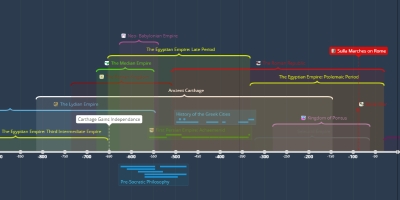Xenophanes (jun 12, 570 BC – dec 12, 475 BC)
Description:
[B]elief occurs in all matters - Xenophanes.
Xenophanes was a wandering sage, forced to leave his native Ionia after the Median invasion of 546. He is best known for his Theological critiques, particularly the anthropomorphic nature of god figures:
"If cows and horses or lions had hands,
Or could draw with their hands and make things as men can,
Horses would have drawn horse-like gods, cows cow-like gods,
And each species would have made the gods' bodies like their own. (Clement, Miscellanies 5.109.3 Stahlin/Fruchtel: Taken from Waterfield 2000, p.27).
Xenophanes speculates upon the nature of the gods - or God as some suppose that he is proposing a Monotheistic notion (although this is largely disputed). He claims that the divine are not like us in any shape or form, all powerful, perfect and exist outside of our temporal realm:
"One God, greatest among gods and men,
In no way similar to mortal men in body or thought. (Clement, Miscellanies 5.109.3 Stahlin/Fruchtel: Taken from Waterfield 2000, p.26).
"Complete he sees, complete he thinks, complete he hears." (Sextus Empiricus, Against the Professors 9.144.4 Bury: Taken from Waterfield 2000, p.26).
"Concerning the gods, he declared that there is no hierarchy amongst them, since it is sacrilege for any of the gods to have a master; and none of them is in the slightest need of anything; and they see and hear as a whole, rather than partially." ( Ps.-Plutarch Miscellanies 4.9-11 Diels: Taken from Waterfield 2000, p.28).
Although it is clear that Xenophanes - at least from these translations - was not a monotheist, it is rather interesting that he seems to be proposing some of the characteristics of the Judeo-Christian God (aside from being made in our image). Critical of the Hellenistic Polytheism of flawed and squabbling gods, with all their imperfections and limitations; he proposes an all powerful council of gods, omnipresent, omnipotent and omniscient. Waterfield suggests that his notions is influenced by Heraclitus's notion of the 'boundless,' speculating that this is what he is referring to (Waterfield 2000, p.22). Part of his theological critique concerned the demystification of various natural phenomenon such as clouds and rainbows. This represents an essential transition which characterises the significance of the Presocratics; the transition from Mythos to Logos. Xenophanes just like his contemporaries, are beginning to construct an account of the world built from the observation of phenomena and not through myth and legend.
Underlining this inquiry permeated with flashes of logic, is an epistemic claim that individuals are essentially flawed in their ability to know the truth, that "[w]e cannot attain infallible knowledge, and we are limited by the experiences we happened to have encountered. Enquiry can improve matters, but even so we will never attain certainty about the big questions of life." (Waterfield 2000, p.26):
"Indeed, there never has been nor will there ever be a man
Who knows the truth about the gods and all the matters of which I speak.
For even if one should happen to speak what is the case especially well,
Still he himself would not know it. But belief occurs in all matters." (Sextus Empiricus, Against the Professors 7.49.4-7 Bury: Waterfield 2000, p.30).
"Let these things be believed as approximations to the truth." (Plutarch, Table Talk 746b7 Sandbach: Waterfield 2000, p.30)
"The gods did not intimate all things to men straight away,
But in time, through seeking, their discoveries improve." (John of Stobi, Anthology 1.8.2 Wachsmuth/Hense).
Ultimately for Xenophanes, all human knowledge is flawed and based upon belief. Nevertheless, our knowledge still represents a distorted image of the truth and we can make constructive steps to improve our knowledge.
In addition to some meteorological theories, Xenophanes also proposed like Thales that the originating element was water, and that the earth is subject to a constant cycle of flooding and drying out; evidenced by the presence of shells on dry-land and perhaps influenced by Babylonian mythology.
Added to timeline:

Western History and Philosophy
In memory of Micheal Scally.
Date:
Images:
![]()
